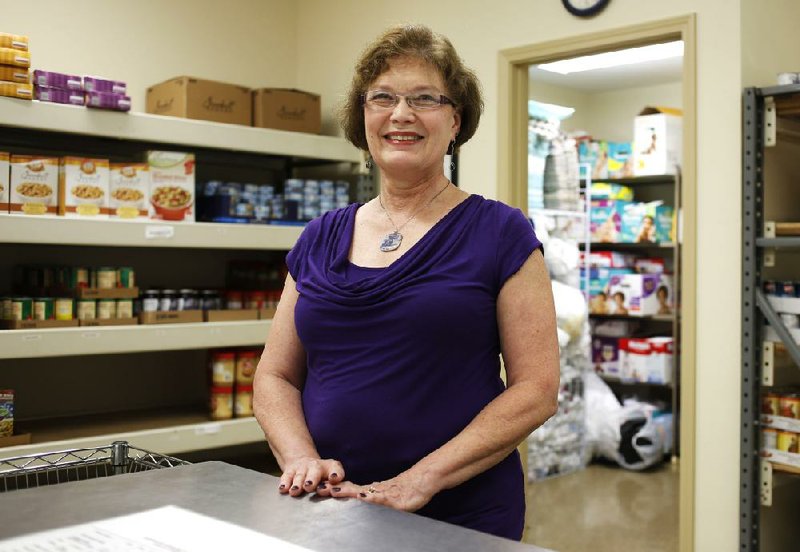FAYETTEVILLE -- Twenty dollars for gas. Fifty dollars for rent. A clothing voucher. Twenty-four dollars to obtain copies of children's birth certificates.
These are just a handful of the checks written recently by Anabelle Steelman-Berry, a volunteer for more than 20 years for Cooperative Emergency Outreach, an organization that helps Northwest Arkansas residents take care of their families.
Cooperative Emergency Outreach is a group of 21 churches that pool their resources to provide food, clothing, gasoline vouchers and rent and utility assistance to those who need them most desperately.
"We try to do whatever the client really needs," Steelman-Berry says. "We have a set amount of funds per day. The interviewer will explain a client's situation to the manager, what he needs, and we will figure out how much we can afford -- what we can do for that person."
The service is designed for anybody in a personal financial emergency.
"Sometimes people are getting along just fine," she says. "But something comes up, their car breaks down, they have a medical emergency and all of a sudden they're just getting behind, they can't do it."
To prevent excessive reliance on the assistance, the cooperative has limits -- utility or rental assistance once per six months per family and gasoline assistance three times per six months.
When clients enter the cooperative they're asked for personal information to verify that they're in the service area -- Washington County south of the Northwest Arkansas Mall.
They are then interviewed privately about their needs and have a short waiting period while volunteers determine how best to help them. Each member church makes a monthly donation and agrees to conduct at least two food drives per year to stock the cooperative, and since holiday food drives are popular, Steelman-Berry says, supplies can run low in summer and early fall.
"They get meals in school and so in the summer when they're home that's a pretty big demand," Steelman says. "Going into the holidays, you have a lot of food drives and in the summer there aren't too many [of those]."
The cooperative provides families with enough food for three days. Many clients don't have transportation, which makes it difficult to carry home more than a few day's worth of groceries.
Since no two churches in the cooperative have the same size congregation, the size of the food drives varies, too.
Larger congregations like Central United Methodist Church conduct them monthly. To keep the interest in donations fresh, some churches donate a different item each month, such as pasta one month, toiletries the next.
It leaves the smaller congregations and other organizations to conduct one food drive per year, or donate when they can.
Such an interwoven approach to donations removes the burden from individual churches to provide a full range of items all at once.
Unique to the area is the cooperative's hours. It's open 1-3 p.m. Monday-Friday, making it the only organization in the area that provides food each weekday.
That means they need a lot of helping hands.
It takes 500 volunteers altogether, including 150 regulars, to cover daily operations.
"If they can't work from 1-3, they can help pick food up from the Rice Depot, unload food, bag [it], maintain the website or email people," she says. "There are jobs that volunteers can do even if they can't work here while we're open."
The cooperative also relies on the Northwest Arkansas Food Bank, the Rice Depot in Little Rock and frequently receives chicken donations from Tyson Foods.
"We take frozen meat wherever we can get it and the more we can get in food drives, the less we have to buy," Steelman-Berry says.
Relying on a handful of big donors has its downside, though. When one is out of a popular item, it can be months before the cooperative stocks it again.
For the next six weeks or so, that item is peanut butter.
"The less money we spend on food, the more we have for utilities, gasoline or things like that," she says.
With food needs covered more often than not, the cooperative's primary concern is maintaining their location.
A year ago, the cooperative bought a building for its use, a bigger space that provided a more comfortable setting, interview rooms, a food pantry and food storage areas, a big improvement over the first two locations, a former jailhouse and an older building on the former Fayetteville City Hospital property.
An ongoing capital campaign raised most of the needed funds to cover the move, but the organization is still making payments for the building. It's a tall order, given that the cooperative's primary donations are food.
"We had to move and that was kind of a scary time because we had no money," Steelman-Berry says. "Everything that we get we give out; it's not like you have a savings account. Everything that comes in goes to the clients."
Knowing that they're helping local families during difficult times makes all the uncertainty about the future worth the effort and investment, she says.
"Sometimes people are in such desperate need that when we help them, they are in tears, grateful because you just managed to keep them from getting their electricity turned off," Steelman-Berry says. "That's very special."
For more information on the Cooperative Emergency Outreach, visit ceofayetteville.org or call (479) 444-7500.
NW Profiles on 09/28/2014
